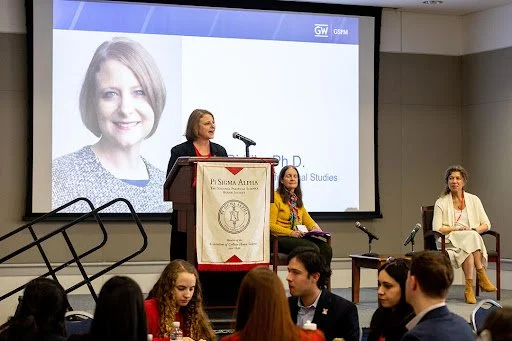A Weekend at the Political Science Honor Society Pi Sigma Alpha Student Research Conference
Dean Liesl Riddle giving opening remarks, joined by Diana Owen and Yesim Sayin. (Mariah Miranda Photography). Source for Photo: GWtoday
From February 17th to 19th of this year, students and scholars gathered at George Washington University in Washington D.C. for the 2023 Pi Sigma Alpha National Student Research Conference. Founded in 1920, Pi Sigma Alpha (PSA) is the only national Political Science Honor Society in the United States. The weekend was an opportunity for political science students to participate on panels, present their research, and engage in career networking. While there, I sat down with the current President of PSA, Dr. Diana Owen, to learn more about the organization and the many opportunities available to political science students at UNC-Chapel Hill.
Dr. Owen is a professor at Georgetown University, currently focused on the relationship between civic education and political engagement, and her tenure as President of PSA began in 2020. Dr. Owen was more than happy to discuss the work that she has been engaged in and all of the opportunities that PSA provides for its university chapter members.
She began by pointing out that the annual student research conference is by far the most visible feature of PSA, and is the culmination of months of preparation. What’s more, this year’s conference was even more of a challenge than in years past. Since she began her tenure as President in the midst of the Covid-19 pandemic, this was her first year organizing an in-person event – “This year, our number of student participants grew to 500 from about 125 in previous years. Honestly, we didn’t anticipate the number of applicants and were a little nervous about space and logistics.” She credited the staff at George Washington University for their role in ensuring a smooth event. “We had 55 in-person panels and 87 that were online… and we were all just blown away by the level of sophistication that the students brought to their research,” she explained.
Dr. Owen made sure to highlight the networking opportunities that were also available throughout the conference’s weekend activities, saying “We partnered with individuals from leading industries and political science related careers to be available to answer any questions that students might have about their future.” On the first night of the conference, PSA hosted a Career ‘Ask-Me-Anything’ Networking Reception, with tables representing jobs in government, lobbying, academia, non-profits, and media and publishing. Aside from the national conference, PSA facilitates the Pi Sigma Alpha Undergraduate Journal of Politics in conjunction with Elon University and holds cash prize contests for Best Paper and Best Thesis. In addition, the organization awards scholarships and internships for both undergraduate and graduate political science students.
While Dr. Owen laid out a number of opportunities available to students, she was most excited about the resources accessible to campus chapters. She spoke with such an enthusiasm about the Chapter Grant Program, in which PSA chapters can apply for funds that can be used for a variety of activities on campus and in their communities, stating that“We really do have a lot of money that is just left on the table, and we want our chapters to take advantage of this.” The national organization offers a variety of specialized grants: Civic Engagement Grants for voting registration efforts and community organizing events, Speaker Funds to help bring in lecturers, and Start-Up Grants for new chapters. Additionally, she adds that chapters are more than welcome to apply for funds no matter the need, and the organization will even work with individual chapters in shaping grants to meet those needs.
Lastly, I asked Dr. Owen what she felt was the most rewarding aspect of her role as the head of PSA. She replied: “For me, my favorite thing is meeting the students at conferences and various chapter engagement events. Feeling the camaraderie amongst students, advisors, and faculty makes me feel like we’re really doing something special here at PSA.” She added that the recent Strategic Planning Meeting with the Executive Council determined that to better serve their members, a chapter-focused path was the best way forward, adding “We really are looking to the many individual chapters for ideas.”
After speaking with Dr. Owen, it is clear that the PSA National Political Science Honors Society represents a unique opportunity for political science students and the entire Chapel Hill community. From funding for outreach programs to networking and career-building opportunities, the national PSA organization is ready to support students and faculty in their efforts to grow as individuals, a community, and a field.

